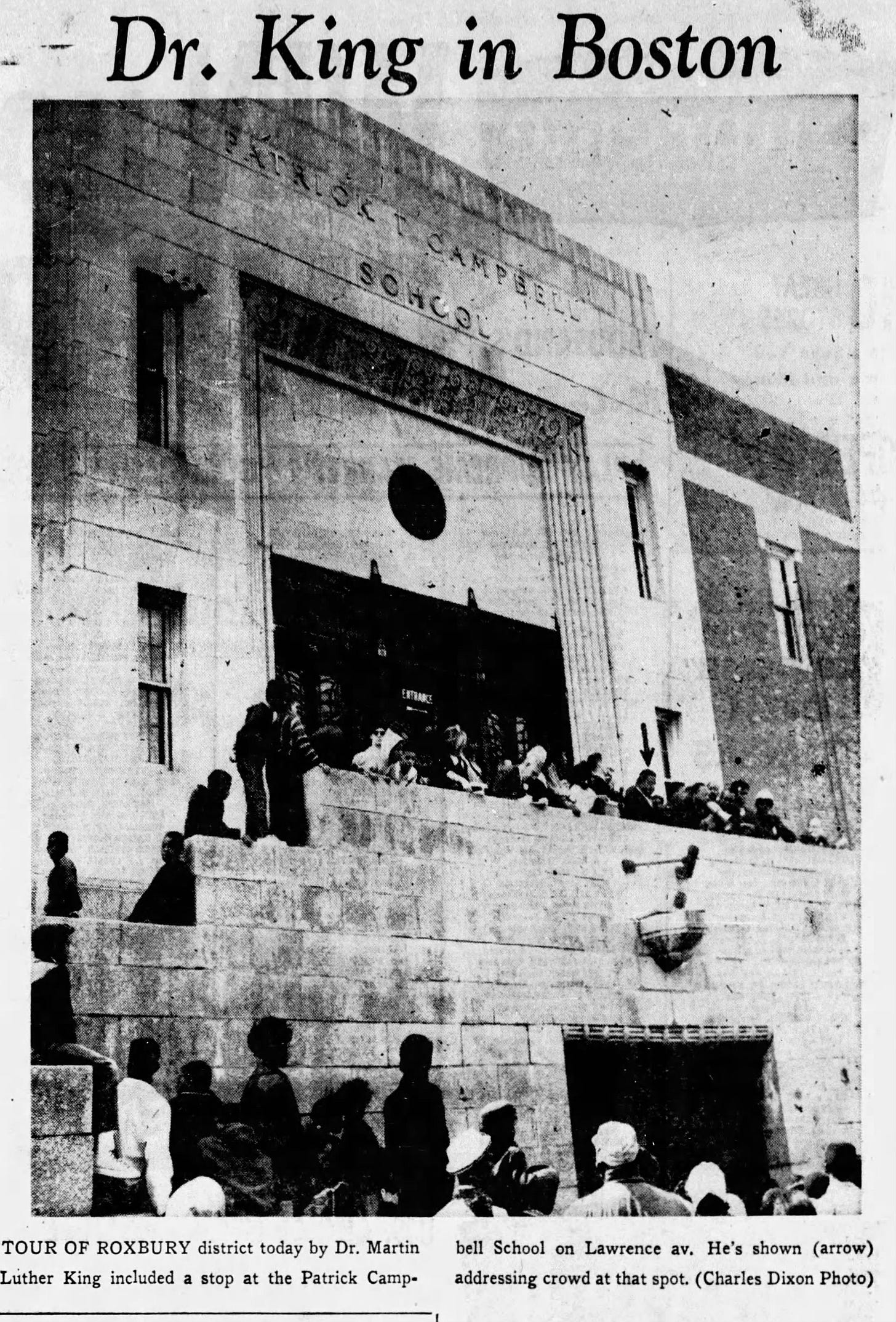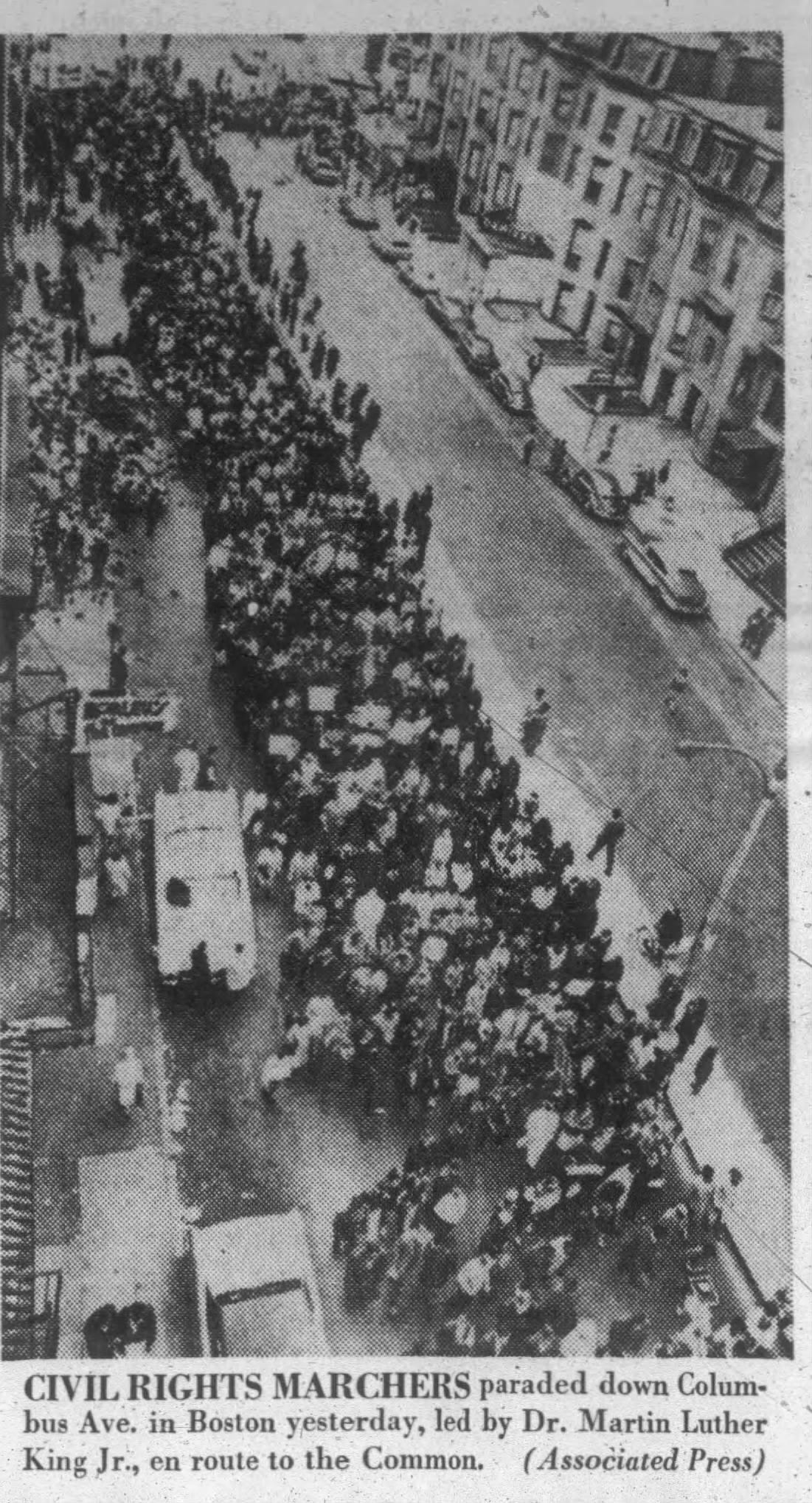In honor of Martin Luther King Day, Dr. King's visit to Boston April 1965
“Our children have been told, so often, that ‘You do not count, you are a nobody,’ I come to Boston to tell you, you are somebody.”
Welcome or welcome back to History Buzz! If you’re a subscriber to the Buzz, thank you! If you’re new here, or you haven’t become a subscriber yet, please sign up for a subscription to have History Buzz delivered directly to your inbox. If you can, please consider a paid subscription to support the research and writing that make History Buzz possible.
Dr. King’s visit to Boston
Today in honor of Martin Luther King Day, we take a look back to April 22 and 23, 1965 and Dr. King’s two-day visit to Boston. A group from Andover attended the event.
Dr. King arrived in Boston Thursday, April 22. On his full schedule that day was a visit with Massachusetts Governor John A. Volpe at the State House. He then visited the predominately Black neighborhood of Roxbury, where he was scheduled to visit the Patrick T. Campbell, William Boardman, and Gibson Schools.
However, he was not admitted to the Boardman school. The Boston Globe reported that Dr. King was escorted to the school by a uniformed Boston Police officer, but, after a short conversation with a school official, the door was “slammed and locked. No reason given publicly.”
King went on to speak to a crowd at the Patrick Campbell School.
After the school visits, Dr. King proceeded to an ecumenical conference and a fundraising event before addressing a joint session of the Massachusetts Legislature. He ended the day by addressing a Passover service in Temple Israel in Boston’s Back Bay.
The Andover marchers
The next day, as reported by the Andover Townsman, the Andover Citizens for Equal Opportunity arranged for a bus to transport local residents to the scheduled Civil Rights march. The bus would meet up with marchers between Roxbury and Boston Common, where Dr. King was scheduled to speak at 12:30.
The march, however, started two hours late, kicking off from the Carter playground in Roxbury at 11:30 rather than 9:30.
The Andover marchers would have joined a crowd of 18,000 people who stood in the rain to hear Dr. King speak.
“We march in Boston to tell Boston, and the rest of the nation that we will no longer tolerate segregation which is a new form of slavery . . . We say we are through with segregation now and forevermore.”
“Our children have been told, so often, that ‘You do not count, you are a nobody,’ I come to Boston to tell you, you are somebody.”
Dr. King commented on being welcomed by Massachusetts Governor Volpe,
“It is not always easy for me to see the governors of some of our states . . . In fact, I have not seen Gov. George C. Wallace of Alabama yet.”
The following week, the Andover Townsman ran a small article on the 30 residents who rode the Andover Citizens for Equal Opportunity bus to the march. Among the 30 were those from Philips Academy, the Brooks School, South Church, and Andover Citizens for Equal Opportunity.
Three years later, at 6:05 P.M. on Thursday, April 4, 1968, Martin Luther King was assassinated while standing on a balcony outside his second-floor room at the Lorraine Motel in Memphis, Tennessee. King's birthday was approved as a federal holiday in 1983, and all 50 states made it a state government holiday by 2000.
Thank you, as always, for reading,
~Elaine
Links
A big thank you to History Buzz’s paid subscribers who help make ACHC’s access to Newspapers.com possible!
Dr. King’s timetable, Boston Globe, April 21, 1965
School door closed, North Adams Transcript, April 22, 1965
Photos of Dr. King at the Campbell School, Boston Globe, April 22, 1965
Expectations for the march and photo of the Legislature, Boston Globe, April 23, 1965
Reports on the march, The Berkshire Eagle, April 24, 1965
Andover residents to ride bus, Andover Townsman, April 22, 1965
Report on Andover residents bus ride, Andover Townsman, April 29, 1965









A fitting recollection and tribute on this MLK Day
I graduated from high school in Brighton in 1965. I remember the turmoil surrounding the bussing of students and the calls for equal opportunity for all our citizens. I’m not sure we’ve ever succeeded in leveling the playing field.